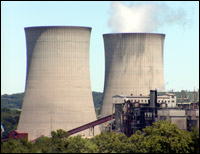It all started so well. Almost exactly three years ago, Ontario’s government announced the construction of two new nuclear reactors to replace ageing parts of our current power supply. Despite the drawbacks of being announced in the middle of summer vacation season and happening in Ontario, it nonetheless made news around the world. This was probably the furthest that any proposal for nuclear building had gotten in the 21st century, and it was kind of a big deal: The Washington Post said it “put Canada at the leading edge of what the nuclear industry calls a ‘renaissance’ of support for nuclear power.”
The usual suspects touted Ontario’s nuclear ambitions as a sign that nuclear power was hip and cool again. See — even the Canadians are doing it!
Oh, how the mighty have fallen. Earlier in the spring, there were persistent rumours that, after getting bids from the major nuclear players, Energy and Infrastructure Minister George Smitherman was suffering from “sticker shock”. Throw in a major global recession, and a provincial government that his already mired in a scandal for wasting taxpayer’s money by the millions, and it was starting to look bleak for the our shiny new reactors. It certainly didn’t help that the Federal government decided to throw a monkey wrench into things.
Then, this morning, we get a short press release from George Smitherman’s office:
The Government of Ontario today announced that it has suspended the competitive RFP to procure two replacement nuclear reactors planned for the Darlington site….
The submission from AECL was compliant with the terms of the RFP and the objectives of the Government. However, concern about pricing and uncertainty regarding the company’s future prevented Ontario from continuing with the procurement at this time.
This makes my home and native land the latest jurisdiction to reconsider the much-ballyhooed, little-realized nuclear renaissance.
Of course, this is happening at the same time as Ontario reels out major new subsidies for green energy and remains committed to phasing out coal for good by 2014. No word on whether that will be pushed back for a second time because of the nuclear delays, so it’s possible that this is at best a mixed blessing. But given that at the very least we’re looking at saving billions of dollars, I call this a win.


